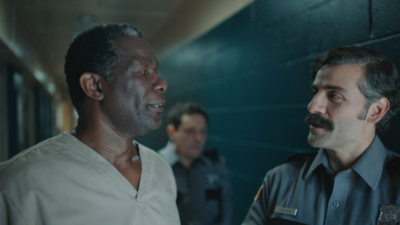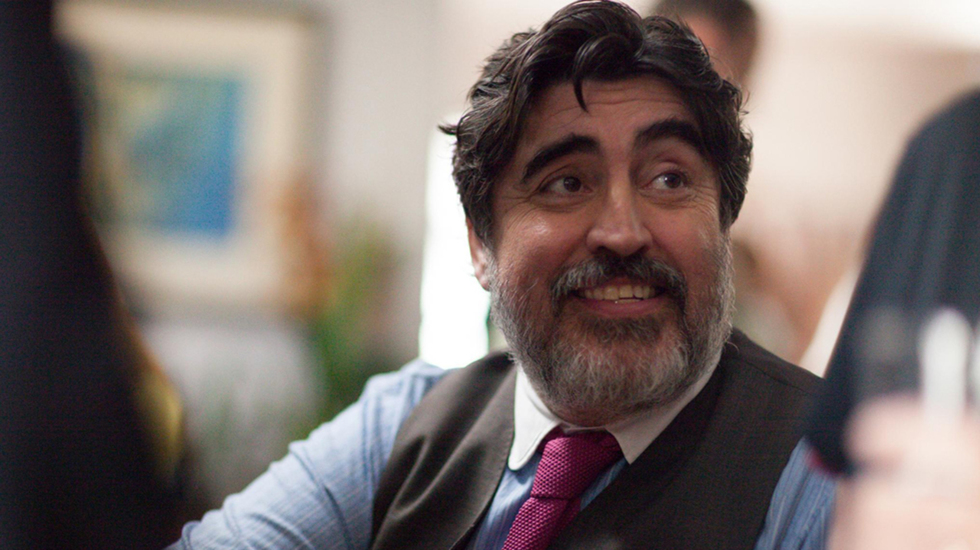
BY KAREN KEMMERLE |
Alfred Molina On ‘Love Is Strange’ And The Joys of Working in Indie Film
We chat with the actor about working with Ira Sachs, his creative process, and playing a nice guy (finally!).

One of the most acclaimed films at this year’s Tribeca Film Festival was, without a doubt, Ira Sachs’ Love Is Strange. Starring John Lithgow and Alfred Molina, the film follows Ben and George, a gay married couple forced to live with family and friends when George loses his job because of discrimination. Ira Sachs’s sixth feature deftly explores the complexities and nuances of modern relationships.
We were lucky enough to speak to Alfred Molina about love, the indie film world, and why being an actor is closer to being a plumber than you might think.
Tribeca: It’s so rare these days to watch a movie about a mature long-term relationship between two people who just happen to be homosexual. What initially drew you to the role of George?
Alfred Molina: In addition to the fact that the script came to me very finished and very complete, it was rare to find a character so close to my own sensibilities. I don’t often get the chance to play parts like that. Normally, I’m being some outrageous villain [laughs]. To play someone much closer to me in terms of age and character qualities was very exciting, Plus, I was very interested in working with Ira Sachs. I find it really stimulating to work with directors who I have never worked with before.
Tribeca: The film feels so intimate, as do all Ira Sachs films. I think that is partially due to the depth of the relationship between Ben and George. Can you talk about collaborating with John Lithgow? Did it seem strange to act opposite a friend you’ve known for so long?
AM: It was very easy to hit that level of intimacy in the film because Ira creates such well defined characters. It was easy to see exactly where the couple was at any given time. That made John and my jobs much easier. We’ve known each other for 15 years, but this is the first time we’ve worked together. It’s always nice to work with someone you’ve known a long time—so we just fell into a great situation. There was already an established level of trust, comfort and security.
John’s one of those actors that never drops the ball. He’s always focused and engaged. As a friend, I’ve always found him to be very giving and generous in the way that he deals with people. With all that going for us, the process was quite seamless.
Love is something wondrous and beyond explanation.
Tribeca: I understand that there wasn’t a formal rehearsal process for the film.
AM: Ira doesn’t rehearse. He likes to save energy for the takes. Ira, John and I talked a lot about the characters and scenes. Ira came out and spent two days with me here in LA, and then from here, he went to Calgary where John was filming and spent two days with him there. Ira and I talked about the character, worked out a timeline for the relationship, and clarified any and all issues we had.
So even without typical rehearsals, we did a lot of preparation. We didn’t fly by the seat of our pants. Because of our work ahead of time, we didn’t need to have a read-through or rehearse the scenes in front of the camera. We saved all our creativity for the takes. Sure, we did some blocking, but the cast didn’t perform in any way during that process. When it came to the take, we knew where to be and we were all very fresh. I loved that.
Tribeca: Ira’s films are always so character-driven and insightful. Were you familiar with his work before you signed on?
AM: I was not as familiar with his work as some people I’ve worked with before, but I was familiar enough to know that I wanted to work with him. I like his style; I like the way he lets the characters and the moments breathe. I like that he is not afraid of lingering on a moment as long as he is telling an interesting story.
Tribeca: If you had to pick one word to describe Ira as a director, what would it be and why?
AM: I think it would be focused. While he’s working, there’s absolutely nothing else going on. He’s completely engaged in that moment, whatever that moment might involve. That’s a very nice feeling for an actor because you know whatever you try, he’s going to be completely giving it all of his attention. Or he’ll tell you it doesn’t work and to try something else. He was completely there and that made me feel very safe and secure.

Tribeca: Indie auteurs like Ira Sachs aren’t afraid to let their actors go after those difficult moments.
AM: He just has a wonderful way of letting a scene develop. There’s a scene with Charlie Tahan, who plays Ben’s nephew, during which he leaves the apartment and suddenly stops in the stairwell by the window while a lady walks past him. Charlie has this beautiful movie moment when he just breaks down. It’s a stunner. Another director might have been tempted to cut away to the street and cut back to create some sort of awareness. Another director might’ve encouraged Charlie to cry more audibly or loudly. Ira just let him stand there and just slowly break down in his own way and in his own time. He didn’t even move the camera. It’s such a beautifully poised, beautifully timed shot.
Tribeca: I love the scene between you and Charlie Tahan at the end of the film too.
AM: I had a lovely time working with Charlie. I think he’s the real revelation of the movie. His performance is quite superb. If he wants it, he’s got a great future as an actor. I think he was still 15 when we shot the movie. He’s so completely authentic and always just there. He didn’t get in his own way, which is a problem that a lot of young actors experience. He never lost his concentration. I think he enjoyed working in this film.
Maybe it’s a bit romantic of me, but I think the really beautiful thing about independent film is that no one is there for the paycheck.
Tribeca: What do you think Love is Strange says about the nature of love?
AM: I think that answer can be found in the title. I always took it to mean “strange” in the Shakespearean sense - meaning something mystical, unexplainable, and magical. That’s a very interesting quality about love. When you fall in love, do you know why? Why with that particular person? It’s amazing that you have no control of it. That’s how I take the meaning. Love is something wondrous and beyond explanation. I think that resonates with audiences.
Tribeca: What is your favorite thing about working in an independent movie?
AM: There’s a level of freedom I find really exciting, even though you might be working under financial restraint and the constraint of time. Time is a luxury, and every little moment is important. Maybe it’s a bit romantic of me, but I think the really beautiful thing about independent film is that no one is there for the paycheck. People are there because they believe in the project. That in itself is a good enough reason to be there. There’s a wonderful sense of family when you’re working on an independent film.
Tribeca: Throughout your career, you’ve switched between film, TV and theater roles. Do you find yourself changing your creative process at all?
AM: No, but I think the technique changes. You use a different set of muscles depending on what’s required. The impulse to work, the desire to get involved, is always the same—no matter if the project is a movie, TV show or theater piece. I think the only thing that is different is the circumstances. I used to have this drama teacher in college who likened the acting process to plumbing. One day plumbers might be working on an intricate showerhead; the next day they might be clearing drains. They use different tools given the circumstances that all come out of the same box.
Click here to see if Love is Strange is coming to a theater near you.

